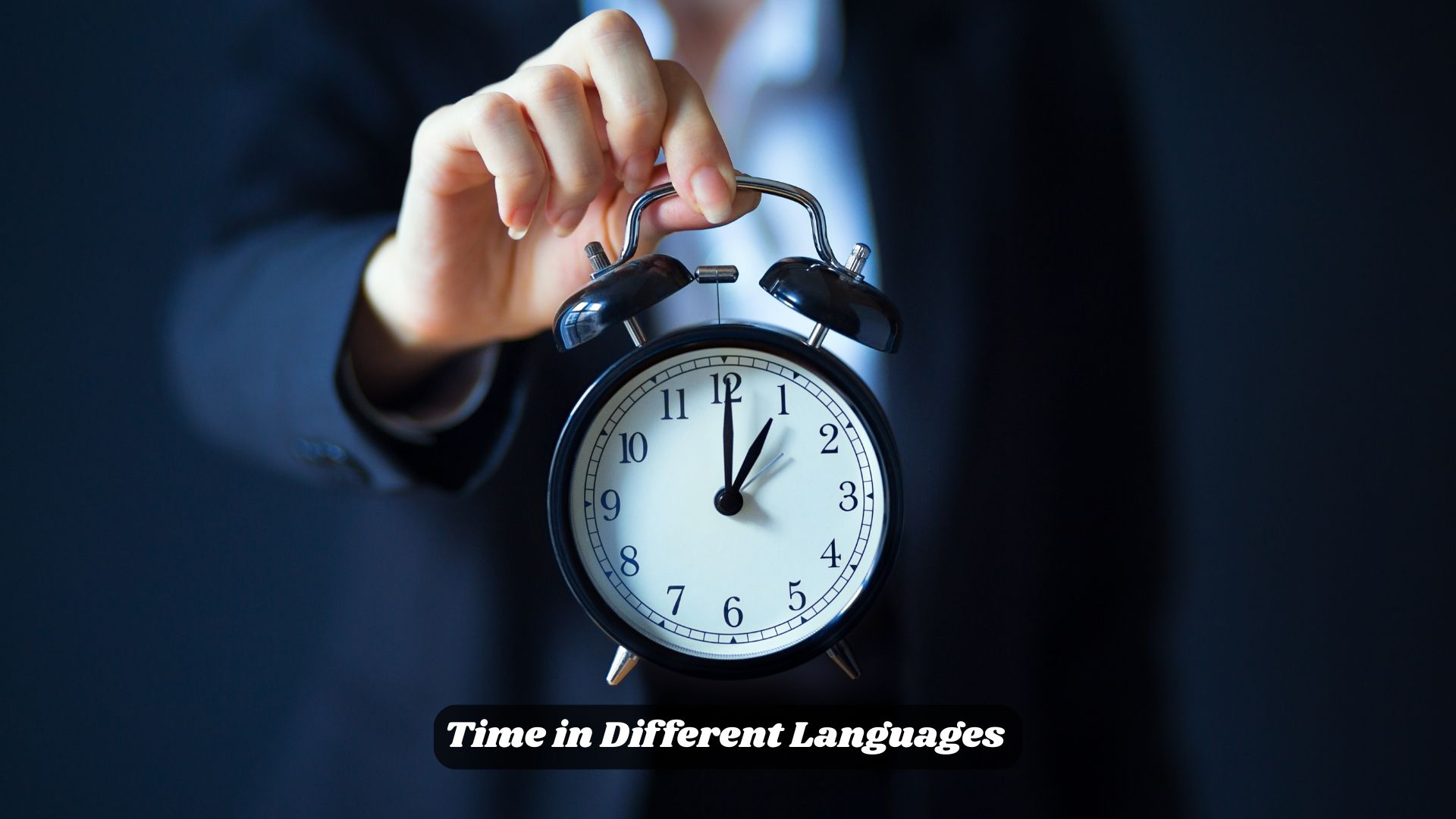People all over the world live by the clock — waking up, working, eating, and sleeping according to time. It’s one of the most common words used in every language.
But how do different cultures say it?
If you’re curious about the word time in other languages — maybe for a tattoo, a project, learning, or storytelling — this guide will help you.
Not only will you learn the translations, but also how to pronounce them and use them in a simple sentence.
Let’s travel through time… globally!
🌍 How to Say Time in 70 Different Languages
Each line includes:
Language Name (🇨🇳) – [Translation] | Pronunciation: [Simple English Pronunciation]
Example sentence.
- Spanish (🇪🇸) – Tiempo | Pronunciation: tyem-poh
No tengo mucho tiempo hoy. - French (🇫🇷) – Temps | Pronunciation: tahm
Le temps passe vite. - German (🇩🇪) – Zeit | Pronunciation: tsite
Ich habe keine Zeit. - Italian (🇮🇹) – Tempo | Pronunciation: tem-poh
Il tempo vola. - Portuguese (🇵🇹) – Tempo | Pronunciation: tem-poo
O tempo está passando rápido. - Turkish (🇹🇷) – Zaman | Pronunciation: za-mahn
Zaman çok hızlı geçiyor. - Russian (🇷🇺) – Время | Pronunciation: vrye-mya
Время летит незаметно. - Mandarin Chinese (🇨🇳) – 时间 | Pronunciation: shí jiān
我没有时间了。 - Japanese (🇯🇵) – 時間 | Pronunciation: ji-kan
時間が足りません。 - Korean (🇰🇷) – 시간 | Pronunciation: shi-gan
시간이 너무 빨라요. - Hindi (🇮🇳) – समय | Pronunciation: samay
समय बहुत कीमती है। - Urdu (🇵🇰) – وقت | Pronunciation: waqt
وقت تیزی سے گزر رہا ہے۔ - Arabic (🇸🇦) – وقت | Pronunciation: waqt
الوقت يمر بسرعة. - Bengali (🇧🇩) – সময় | Pronunciation: shomoy
আমার কাছে সময় নেই। - Greek (🇬🇷) – Χρόνος | Pronunciation: khro-nos
Ο χρόνος πετάει. - Polish (🇵🇱) – Czas | Pronunciation: chas
Nie mam czasu. - Dutch (🇳🇱) – Tijd | Pronunciation: tide
Ik heb geen tijd. - Swedish (🇸🇪) – Tid | Pronunciation: teed
Tiden går snabbt. - Norwegian (🇳🇴) – Tid | Pronunciation: teed
Jeg har ikke tid. - Finnish (🇫🇮) – Aika | Pronunciation: eye-kah
Aika lentää. - Danish (🇩🇰) – Tid | Pronunciation: teed
Tiden løber hurtigt. - Hungarian (🇭🇺) – Idő | Pronunciation: ee-doh
Nincs időm. - Czech (🇨🇿) – Čas | Pronunciation: chas
Nemám čas. - Romanian (🇷🇴) – Timp | Pronunciation: teemp
Nu am timp. - Swahili (🇰🇪) – Wakati | Pronunciation: wah-kah-tee
Sina wakati wa kutosha. - Zulu (🇿🇦) – Isikhathi | Pronunciation: ee-see-khah-thi
Anginawo isikhathi. - Xhosa (🇿🇦) – Ixesha | Pronunciation: ee-kheh-shah
Andinaxesha. - Vietnamese (🇻🇳) – Thời gian | Pronunciation: thuh-ee yan
Tôi không có thời gian. - Thai (🇹🇭) – เวลา | Pronunciation: weh-lah
ฉันไม่มีเวลาเลย - Indonesian (🇮🇩) – Waktu | Pronunciation: wahk-too
Saya tidak punya waktu. - Malay (🇲🇾) – Masa | Pronunciation: mah-sah
Saya tiada masa sekarang. - Tagalog (🇵🇭) – Oras | Pronunciation: oh-ras
Wala akong oras ngayon. - Esperanto (🌍) – Tempo | Pronunciation: tem-poh
Mi ne havas tempon. - Catalan (🇦🇩) – Temps | Pronunciation: tems
No tinc temps. - Galician (🇪🇸) – Tempo | Pronunciation: tem-po
Non teño tempo. - Basque (🇪🇸) – Denbora | Pronunciation: den-boh-rah
Ez dut denborarik. - Welsh (🏴) – Amser | Pronunciation: am-ser
Does gen i ddim amser. - Irish (🇮🇪) – Am | Pronunciation: ahm
Níl am agam. - Scottish Gaelic (🏴) – Ùine | Pronunciation: oo-nya
Chan eil ùine agam. - Hawaiian (🇺🇸) – Manawa | Pronunciation: mah-nah-wah
ʻAʻohe aʻu manawa. - Tamil (🇮🇳) – நேரம் | Pronunciation: nay-ram
நேரம் இல்லை. - Telugu (🇮🇳) – సమయం | Pronunciation: sa-ma-yam
నాకు సమయం లేదు. - Kannada (🇮🇳) – ಸಮಯ | Pronunciation: sa-ma-ya
ನನಗೆ ಸಮಯ ಇಲ್ಲ. - Gujarati (🇮🇳) – સમય | Pronunciation: sah-ma-ya
મને સમય નથી. - Punjabi (🇮🇳) – ਸਮਾਂ | Pronunciation: sah-maan
ਮੇਰੇ ਕੋਲ ਸਮਾਂ ਨਹੀਂ ਹੈ। - Marathi (🇮🇳) – वेळ | Pronunciation: vel
माझ्याकडे वेळ नाही. - Sinhala (🇱🇰) – වේලාව | Pronunciation: weh-lah-vah
මට වෙලාව නැහැ. - Nepali (🇳🇵) – समय | Pronunciation: samaya
मसँग समय छैन। - Pashto (🇦🇫) – وخت | Pronunciation: wakht
زه وخت نه لرم. - Persian (🇮🇷) – زمان | Pronunciation: za-maan
من وقت ندارم. - Kurdish (🇹🇯) – Dem | Pronunciation: dem
Ez demek tunim. - Hebrew (🇮🇱) – זמן | Pronunciation: zman
אין לי זמן. - Amharic (🇪🇹) – ጊዜ | Pronunciation: gee-zay
ጊዜ አልባኝም። - Somali (🇸🇴) – Waqti | Pronunciation: wahk-tee
Ma haysto waqti. - Hausa (🇳🇬) – Lokaci | Pronunciation: loh-kah-chee
Ba ni da lokaci. - Yoruba (🇳🇬) – Àkókò | Pronunciation: ah-koh-koh
Mi ò ní àkókò. - Igbo (🇳🇬) – Oge | Pronunciation: oh-geh
Enweghị m oge. - Maori (🇳🇿) – Wā | Pronunciation: wah
Kāore au i te wā. - Samoan (🇼🇸) – Taimi | Pronunciation: tai-mee
E leai sau taimi. - Tongan (🇹🇴) – Taimi | Pronunciation: tai-mee
ʻIkai te u maʻu taimi. - Mongolian (🇲🇳) – Цаг | Pronunciation: tsag
Надад цаг байхгүй. - Lao (🇱🇦) – ເວລາ | Pronunciation: weh-lah
ຂ້ອຍບໍ່ມີເວລາ. - Khmer (🇰🇭) – ពេលវេលា | Pronunciation: pel ve-lea
ខ្ញុំមិនមានពេលវេលា. - Burmese (🇲🇲) – အချိန် | Pronunciation: ah-chein
ငါအချိန်မရှိဘူး။ - Tajik (🇹🇯) – Вақт | Pronunciation: vakht
Ман вақт надорам. - Uzbek (🇺🇿) – Vaqt | Pronunciation: vakht
Menda vaqt yoʻq. - Kazakh (🇰🇿) – Уақыт | Pronunciation: oo-a-kyt
Менде уақыт жоқ. - Georgian (🇬🇪) – დრო | Pronunciation: dro
დრო არ მაქვს. - Armenian (🇦🇲) – Ժամանակ | Pronunciation: zham-a-nak
Ես ժամանակ չունեմ։ - Maltese (🇲🇹) – Ħin | Pronunciation: heen
M’għandix ħin.
🌟 Conclusion
No matter where you are, the word time reminds us that every second counts — in every language

Oliver Grant is a passionate American author known for crafting insightful and engaging content that inspires readers worldwide. With a strong background in creative writing and a deep interest in contemporary literature, Oliver has built a reputation for delivering thought-provoking narratives that resonate with a modern audience.
Throughout his career, Oliver has consistently blended intellectual depth with relatable storytelling, making complex ideas accessible to readers from all walks of life. His writing style is both elegant and approachable, allowing him to connect meaningfully with his audience.
When he’s not writing, Oliver enjoys exploring new ideas, reading across diverse genres, and mentoring aspiring writers. His dedication to the craft and his ability to present fresh perspectives have earned him a loyal following.
Oliver Grant is the author of several acclaimed books, including “The Creative Mindset,” “Stories That Connect,” and “The Modern Writer’s Journey.” Each of these works reflects his commitment to empowering readers and fellow writers through creativity and purposeful storytelling.

